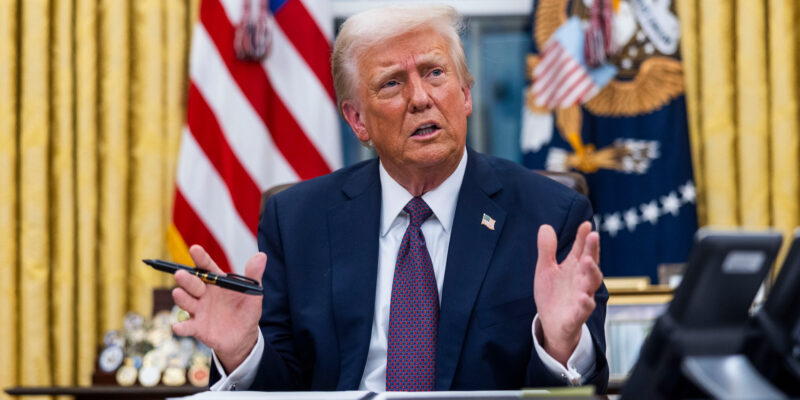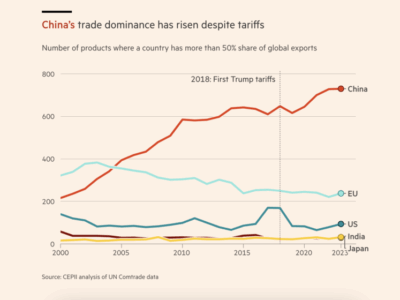
President Donald Trump’s decision to withdraw the U.S. from global tax agreements and negotiations has upended international tax cooperation efforts, but not in the way he may have wanted, with some tax justice advocates saying talks may go more smoothly now.
Trump signed an executive order just hours after returning to the White House on Jan. 20, pulling the country out of an agreement reached with the Organization for Economic Cooperation and Development in 2021 that sets a 15% minimum global tax. Nearly 140 countries have signed the agreement, which seeks to prevent multinational corporations from stashing profit in jurisdictions that allow them to pay low or no taxes. But efforts to implement the new tax have stalled in the past few years.
“This memorandum recaptures our Nation’s sovereignty and economic competitiveness by clarifying that the Global Tax Deal has no force or effect in the United States,” reads the Trump order.
Despite the executive order, on Feb. 3, a U.S. delegation attended the first day of talks to create a separate legally binding tax framework at the United Nations, but left in the afternoon. “It seemed a bit strange when the US showed up at the UN Tax Convention negotiations yesterday. But they had apparently just come to say goodbye,” Tove Maria Ryding, tax Coordinator at the European Network on Debt and Development said in a press release.
Before departing, the U.S. delegation had tried and failed to convince other countries to join the walkout and was the only one to abandon the negotiations, in what tax justice advocates have called “a miscalculated opening gambit.”
A U.S. delegate said the goals of the future convention are “inconsistent with the U.S. priorities and represent [an] unwelcome overreach” and said the U.S. will reject and oppose the outcomes of the UN convention.
“We reject the very nature of these discussions. The process that has been adopted will lead to a Convention that would unacceptably hamper nations’ ability to enact tax policies that serve the interests of their citizens, businesses, and workers,” the delegate said.
The U.S. moves threaten to undermine the global tax efforts. Government officials in India, for example, are questioning if it is worth signing into global tax agreements unsupported by one of the world’s most powerful economies.
It has often been the case that the United States is playing catch up in global efforts.
— Tove Maria Ryding, tax Coordinator at the European Network on Debt and Development
But Alex Cobham, chief executive at the Tax Justice Network said the U.S. walkout could give the rest of the world “an even greater chance of ending global tax abuse.”
“While previous US presidents finessed a double game, promising to cooperate on tax but never doing so, Trump has clumsily given the game away, first pulling the US out of its own sham global tax reforms last month, and now pulling the US out of the most important tax negotiations of our lifetime,” Cobham said in a statement.
Meanwhile, OECD’s secretary general Matthias Cormann told Reuters that, while U.S. representatives raised concerns about various aspects of the minimum global tax agreement, the organization “will keep working with the U.S. and all countries at the table to support international cooperation that promotes certainty, avoids double taxation, and protects tax bases.”
For decades, the OECD has dominated international tax policy. In recent years, many developing countries, including some in the OECD, had begun to question the outsized influence of the organization’s wealthy members and whether a more representative body should be in charge. In August 2023, U.N. secretary general António Guterres issued a report calling for a shake-up of global tax rules — and more power for the U.N. to set them. The report, which was critical of the OECD’s approach, analyzed current international tax cooperation arrangements and laid out Guterres’ vision to ensure they better serve the needs of developing countries.
A year later, following efforts kickstarted by African member states and facing strong pushback from mostly wealthy member states, a majority of countries at the UN voted to approve ambitious parameters for a new global tax convention that could herald a fresh approach to taxing multinational corporations and the super-rich.
The member states met again during the first week of February to start negotiations and are set to deliver a Convention and two early protocols by the end of 2027.
“The response that we have seen already is that most countries stayed. European countries, along with most of the world, seem to be interested in being part of the negotiations,” Ryding told ICIJ. “It has often been the case that the United States is playing catch up in global efforts. We have seen this before with climate, biodiversity, the [World Health Organization]. The [UN global tax] convention is going to include tax to multinationals so sooner or later the U.S. will have to cooperate.”















